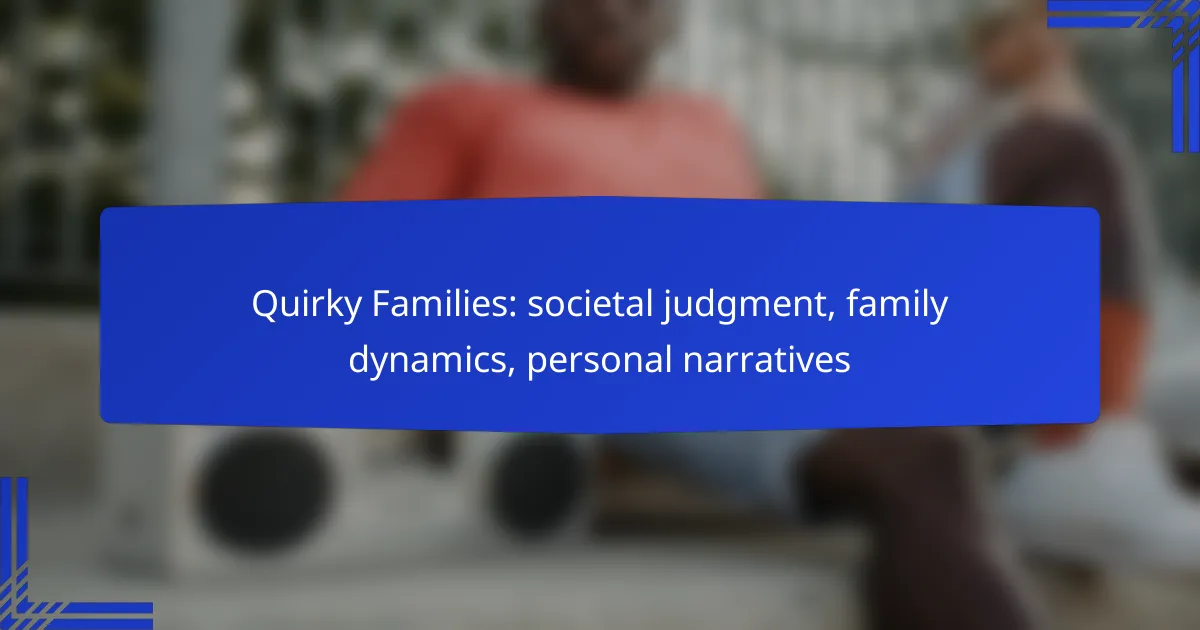Quirky families often challenge societal norms, facing both judgment and misunderstanding from their communities. Their unique dynamics, characterized by unconventional roles and communication styles, can lead to rich personal narratives that highlight resilience and adaptability. By embracing their differences and fostering supportive networks, these families navigate external pressures while cultivating a positive environment for growth and connection.
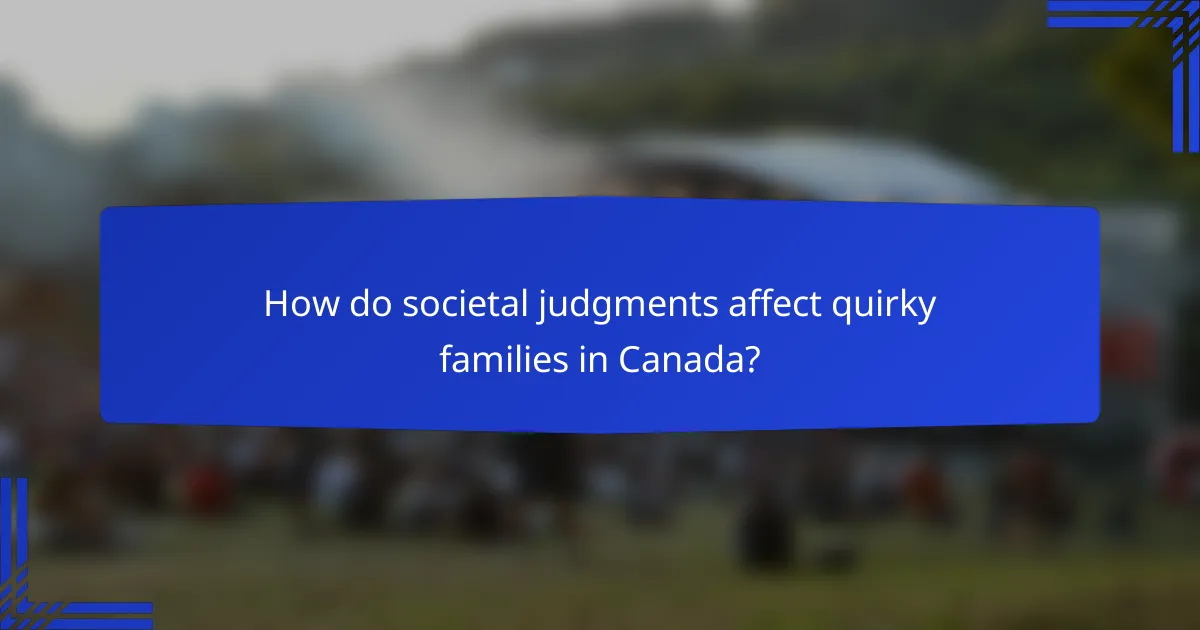
How do societal judgments affect quirky families in Canada?
Societal judgments can significantly impact quirky families in Canada by shaping their experiences and interactions within the community. These families often face stereotypes and misconceptions that can lead to social exclusion or misunderstanding.
Impact of stereotypes
Stereotypes about quirky families often stem from traditional norms regarding family structures and behaviors. These preconceived notions can lead to unfair treatment, as individuals may assume that unconventional families are dysfunctional or problematic.
For instance, a family that embraces alternative lifestyles may be viewed with skepticism, affecting their social interactions and opportunities. This can create a cycle of stigma that reinforces negative perceptions and limits acceptance.
Community perceptions
Community perceptions play a crucial role in how quirky families navigate their daily lives. In some areas, acceptance of diverse family dynamics is growing, while in others, traditional views may still dominate, leading to isolation for those who do not conform.
Families may find support in local groups or networks that celebrate diversity, helping to counteract negative perceptions. However, the lack of such support can make it challenging for quirky families to feel a sense of belonging.
Media representation
Media representation of quirky families can influence societal judgments by either challenging stereotypes or reinforcing them. Positive portrayals in television shows and films can foster understanding and acceptance, showcasing the richness of diverse family experiences.
Conversely, negative or one-dimensional representations can perpetuate harmful stereotypes, making it harder for quirky families to gain acceptance in society. It is essential for media creators to portray these families authentically to promote a more inclusive narrative.
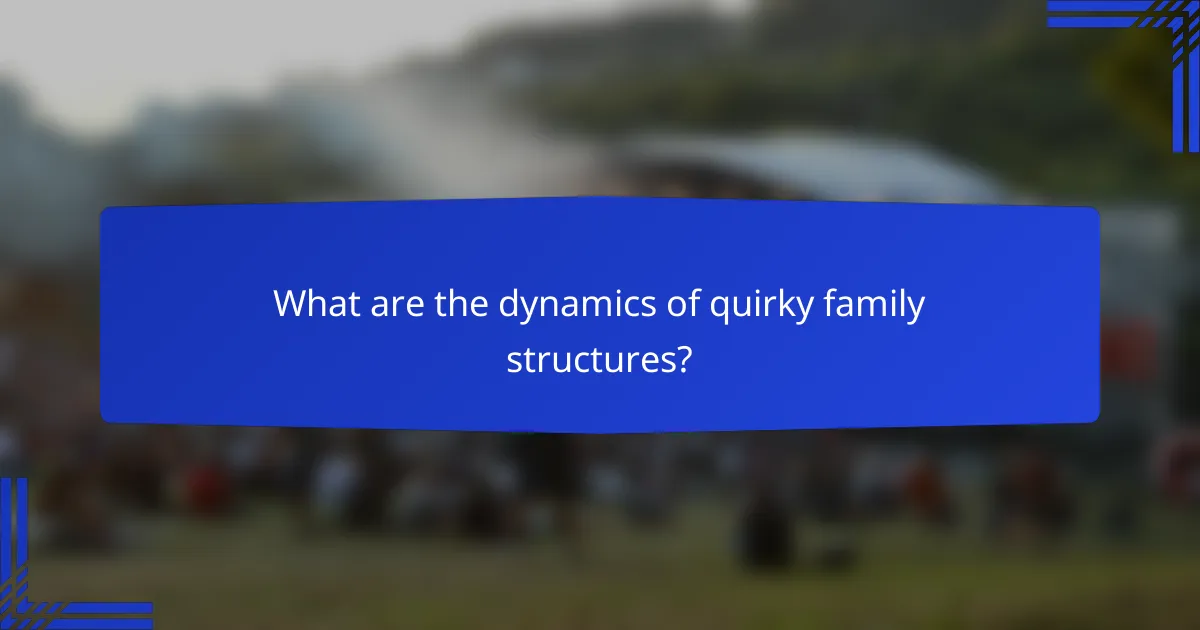
What are the dynamics of quirky family structures?
Quirky family structures often feature unique dynamics that diverge from traditional norms, influencing relationships and interactions. These families may embrace unconventional roles, distinct communication styles, and alternative methods for resolving conflicts.
Non-traditional roles
In quirky families, non-traditional roles can manifest in various ways, such as shared parenting responsibilities or fluid gender roles. For example, a stay-at-home dad may take on primary caregiving duties while the mother works full-time, challenging conventional expectations.
These roles can foster a sense of equality and collaboration, but they may also invite societal judgment. Families should be prepared to navigate external perceptions while reinforcing their unique structure internally.
Communication styles
Communication in quirky families often deviates from the norm, with members employing humor, directness, or even unconventional methods like art or music to express feelings. This openness can strengthen bonds and facilitate understanding, but it may also lead to misunderstandings if not everyone is on the same page.
Encouraging regular family meetings can help establish a comfortable space for sharing thoughts and feelings, ensuring that all voices are heard and valued. It’s essential to adapt communication styles to suit the preferences of each family member.
Conflict resolution methods
Quirky families may adopt unique conflict resolution strategies, such as collaborative problem-solving or creative brainstorming sessions. Instead of traditional approaches, they might prioritize finding solutions that honor everyone’s perspectives and maintain harmony.
Using techniques like role-playing or mediation can be effective in resolving disputes. Families should avoid punitive measures and instead focus on understanding the underlying issues to foster a supportive environment for conflict resolution.
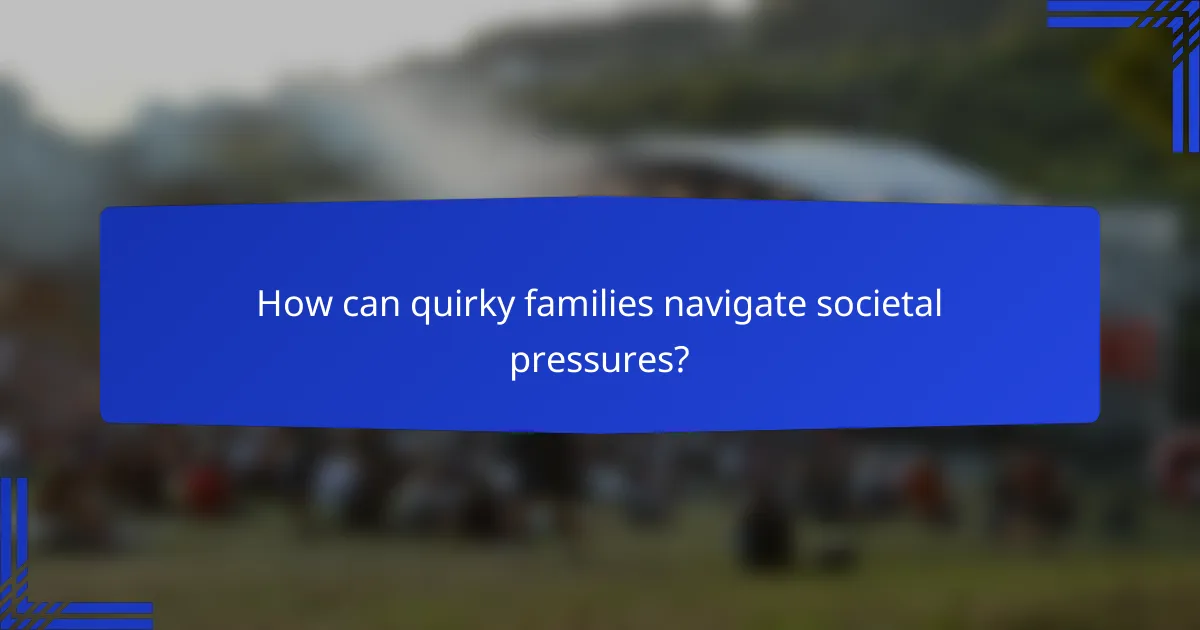
How can quirky families navigate societal pressures?
Quirky families can navigate societal pressures by fostering resilience, building supportive networks, and embracing their uniqueness. These strategies help them manage external judgments and create a positive family dynamic.
Building resilience
Building resilience involves developing the ability to cope with criticism and societal expectations. Quirky families can strengthen their resilience by focusing on their values and maintaining open communication among family members.
Practicing mindfulness and stress-relief techniques can also enhance resilience. Activities such as yoga, meditation, or even family outings can help families bond and reinforce their collective strength against external pressures.
Creating supportive networks
Creating supportive networks is essential for quirky families to thrive. Connecting with like-minded individuals or groups can provide a sense of belonging and validation. Online forums, local meetups, or community events can serve as excellent platforms for building these connections.
It’s important to seek out diverse support systems, including friends, family, and community organizations. These networks can offer emotional support and practical advice, helping families navigate challenges together.
Embracing uniqueness
Embracing uniqueness allows quirky families to celebrate their differences rather than hide them. Recognizing and valuing what makes each family member special fosters a positive self-image and strengthens family bonds.
Encouraging open discussions about individuality can help family members feel accepted and understood. Activities that highlight each person’s talents or interests, such as talent shows or themed family nights, can further reinforce this sense of pride in their uniqueness.

What personal narratives highlight quirky family experiences?
Personal narratives about quirky families often reveal unique dynamics and interactions that challenge societal norms. These stories can showcase the richness of diverse family structures and the lessons learned from unconventional experiences.
Success stories
Many quirky families find strength in their differences, leading to strong bonds and creative problem-solving. For instance, families that embrace unconventional lifestyles, such as homeschooling or communal living, often report enhanced communication and deeper connections among members.
One success story involves a family that turned their love for travel into a lifestyle, living in an RV while exploring various cultures. This experience not only fostered adaptability but also taught the children valuable life skills and global awareness.
Challenges faced
Quirky families frequently encounter societal judgment and misunderstanding, which can strain relationships both within and outside the family unit. For example, families with non-traditional structures may face stigma or lack of support from their communities, leading to feelings of isolation.
Additionally, navigating differing values and lifestyles can create internal conflicts. Families may struggle with balancing individual identities while maintaining a cohesive family culture, which can lead to misunderstandings and tension.
Lessons learned
Quirky families often emerge from their experiences with valuable insights about acceptance and resilience. They learn the importance of embracing differences and fostering open communication to navigate challenges effectively.
Moreover, these families frequently develop a strong sense of identity and belonging, understanding that their uniqueness is a source of strength. They may also cultivate empathy and understanding towards others who are different, enriching their social interactions and community ties.
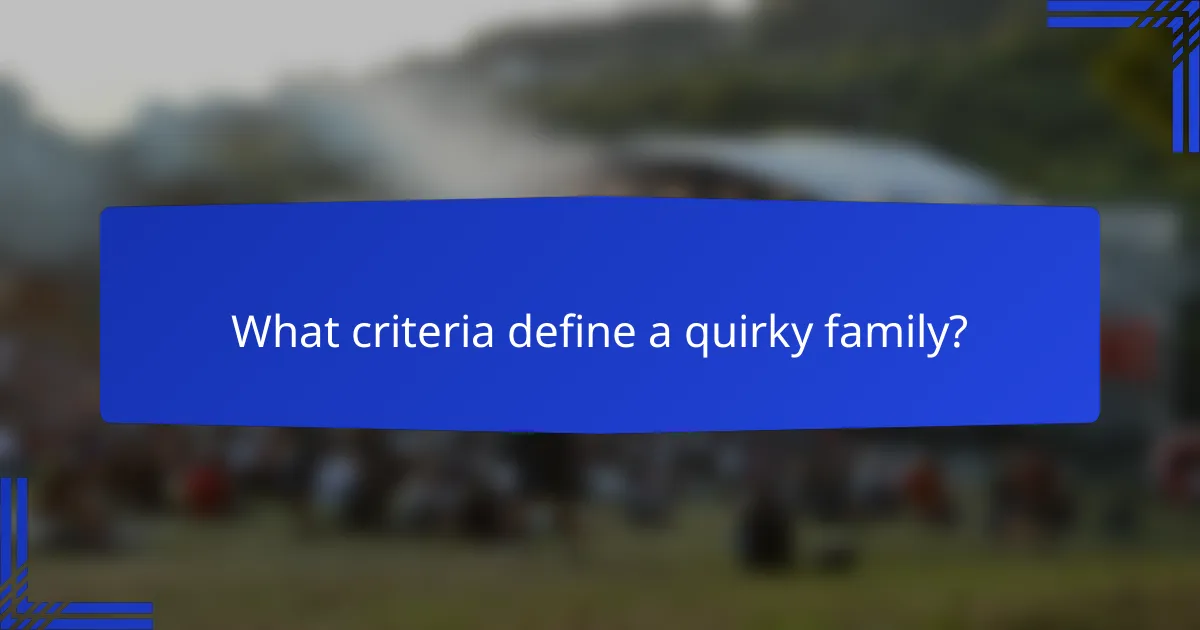
What criteria define a quirky family?
A quirky family is characterized by unique behaviors, unconventional traditions, and distinctive communication styles that set them apart from societal norms. These families embrace individuality, often fostering an environment where creativity and eccentricity thrive.
Characteristics of quirkiness
Quirky families often exhibit traits such as open-mindedness, humor, and a tendency to challenge conventional norms. They may prioritize creativity over conformity, encouraging members to express their true selves without fear of judgment.
Another key characteristic is strong internal bonds, where family members support each other’s unique interests and quirks. This supportive atmosphere can lead to a rich tapestry of experiences and shared memories that strengthen family ties.
Examples of quirky family traits
Examples of quirky family traits include unusual hobbies, such as collecting odd items or engaging in unconventional sports. Some families might have unique traditions, like themed dinners or annual costume parties that reflect their personalities.
Additionally, communication styles can be distinctive, with families using inside jokes, playful banter, or even invented languages. These traits not only highlight their uniqueness but also create a sense of belonging and identity within the family unit.
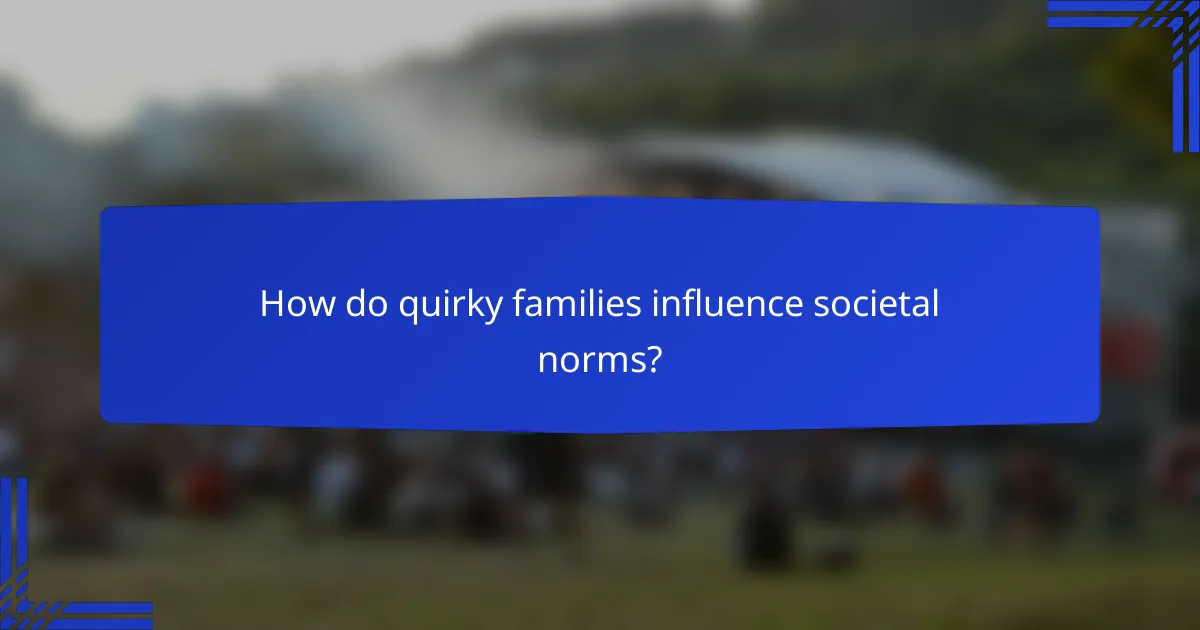
How do quirky families influence societal norms?
Quirky families challenge and reshape societal norms by presenting alternative models of family dynamics and relationships. Their unique structures and practices encourage broader acceptance of diversity in family forms, ultimately influencing cultural perceptions and expectations.
Redefining family values
Quirky families often prioritize values such as creativity, individuality, and open communication over traditional norms. This shift can lead to a more inclusive understanding of what constitutes a family, allowing for varied expressions of love and support. For instance, families that embrace non-traditional roles, such as stay-at-home dads or multi-generational households, exemplify this redefinition.
As these families gain visibility, they inspire others to reconsider their own values and relationships. This can result in a community that values emotional connection and personal fulfillment over rigid adherence to conventional family structures.
Challenging traditional expectations
Quirky families challenge societal expectations by defying stereotypes and embracing unconventional lifestyles. For example, families that practice co-parenting among friends or engage in communal living arrangements highlight alternatives to the nuclear family model. This can provoke discussions about the roles of gender, parenting, and partnership in modern society.
Moreover, the visibility of these families can lead to greater acceptance of diverse family arrangements, reducing stigma and encouraging others to explore their own unique family dynamics. As more people share their stories, the narrative around what is considered “normal” continues to evolve, fostering a more inclusive society.
